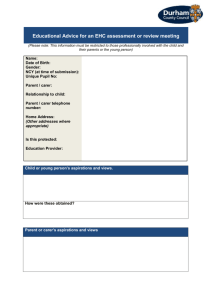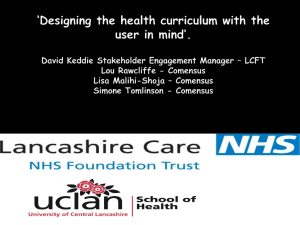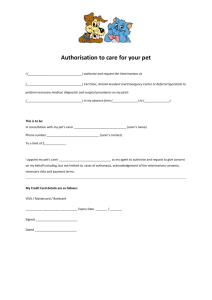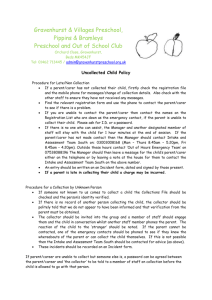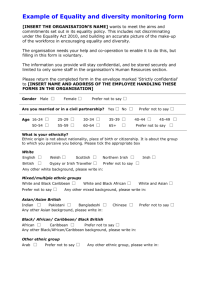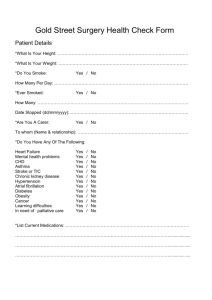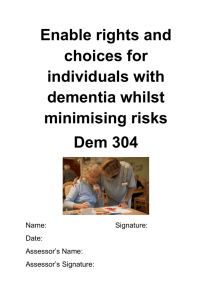This is me - hospital passport. This is me is intended to provide
advertisement
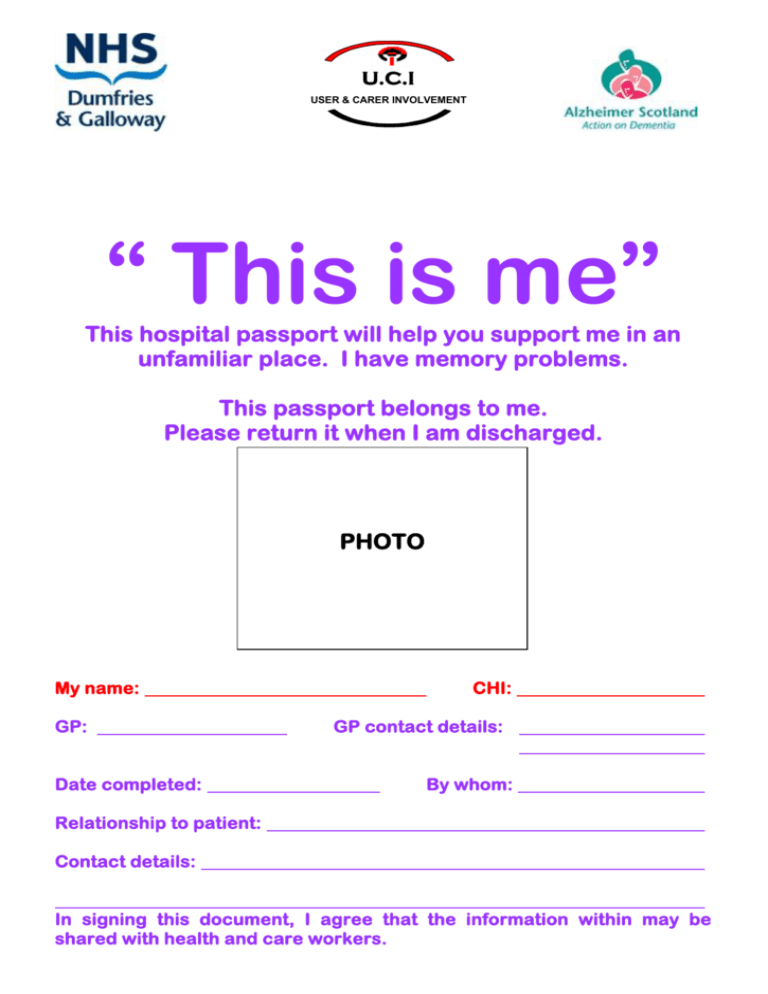
U.C.I USER & CARER INVOLVEMENT “ This is me” This hospital passport will help you support me in an unfamiliar place. I have memory problems. This passport belongs to me. Please return it when I am discharged. PHOTO My name: GP: Date completed: CHI: GP contact details: By whom: Relationship to patient: Contact details: In signing this document, I agree that the information within may be shared with health and care workers. Guidance notes to help you complete “This is me” This is me is intended to provide professionals with information about the person with dementia as an individual. This will enhance the care and support given while the person is in an unfamiliar environment. It is not a medical document. 10. My sleep: Usual sleep patterns and bedtime routines. Do I like a light left on and do I find it difficult to find the toilet at night? Position in bed, any specific mattress, pillow, do I need a regular change of position? This is me is about the person at the time the document is completed and will need to be updated as necessary. This form can be completed by the person with dementia or their carer with help from the person with dementia where possible. 11. My personal care: Normal routines, preferences and usual level of assistance required in the bath or, shower or other. Do I prefer a male or female carer? What are my preferences for continence aids used, soaps, cosmetics, shaving, teeth cleaning and dentures? 1. My name: full name and the name I prefer to be known by. 2. Where I currently live: The area (not the address) where I live. Include details about how long I have lived there, and where I lived before. 3. Carer/the person who knows me best: It may be a spouse, relative, friend or carer. Please include Legal Status i.e. guardianship, welfare power of attorney. Do you have an advance statement? 4. General medical information including allergies: Do I need help to take medication? Do I prefer to take liquid medication? e.g. how to take blood/give injections/check blood pressure. 5. How you know I’m in pain: Does your behaviour change when you are in pain – please describe. How do your usually cope with pain? What helps? 6. How I communicate: How do I usually communicate e.g. verbally, using gestures, pointing or a mixture of both? Can I read and write and does writing things down help? How do I indicate pain, discomfort, thirst or hunger? Include anything that may help staff identify my needs. 7. My hearing and eyesight: Can I hear well or do I need a hearing aid. How is it best to approach me? Is the use of touch appropriate? Do I need eye contact to establish communication? Do I wear glasses or need any other vision aids? 8. My mobility: Am I fully mobile or do I need help? Do I need a walking aid? Is my mobility affected by surfaces? Can I use stairs? Can I stand unaided from sitting position? Do I need handrails? Do I need a special chair or cushion, or do my feet need raising to make me comfortable? 9. My eating and drinking: Do I need assistance to eat or drink? Can I use cutlery or do I prefer finger foods? Do I need adapted aids such as cutlery or crockery to eat and drink? Does food need to be cut into pieces? Do I wear dentures to eat or do I have swallowing difficulties? What texture of food is required to help, soft or liquidised? Do I require thickened fluids? List likes, dislikes and any special dietary requirements including vegetarianism, religious or cultural needs. Include information about my appetite and whether I need help to choose off a menu. 12. Things which may worry or upset me: Anything that may upset me or cause anxiety such as personal worries, e.g. money, family concerns, or being apart from a loved one, or physical needs, e.g. being in pain, constipated, thirsty or hungry. 13. I would like you to know: Include anything I feel is important and will help staff to get to know and care for me, e.g. I have dementia. I have never been in hospital before, I prefer female carers, I don’t like the dark, I am left handed. 14. My likes and dislikes: include what you think is important. 15. My religion/spiritual needs: is a hospital visit required. 16. My ethnicity 17. How I keep safe: Any equipment e.g. bedrails, any assistance with challenging behaviour. 18. I like to relax by: Things which may help if I become unhappy or distressed. What usually reassures me, e.g. comforting words, music or TV? Do I like company and someone sitting and talking with me or prefer quiet time alone? Who would be contacted to help and if so when? 19. My home and family, things that are important to me: Include marital status, children, grandchildren, friends, pets, any possessions, things of comfort. Any religious or cultural considerations. 20. My life so far: place of birth, education, work, history, travel etc. 21. My hobbies and interests: Past or present – e.g. reading, music, television or radio, crafts, cars. Identify what level of assistance would be required 1. My name: full name and the name I prefer to be known by 2. I currently live 3. Carer/the person who knows me best/named person/welfare power of attorney/advance statement 4. My general medical information/allergies/pain 5. How you know I’m in pain 6. How I communicate 7. My hearing and eyesight 8. My mobility Date completed: 9. My eating and drinking 10. My sleep 11. My personal care 12. Things which may worry or upset me 13. I would like you to know 14. My likes and dislikes 15. Religion/Spiritual needs Date completed: 16. Ethnicity 17. How I keep safe 18. I like to relax by 19. My home and family, things that are important to me 20. My life so far 21. My hobbies and interests Date completed:
